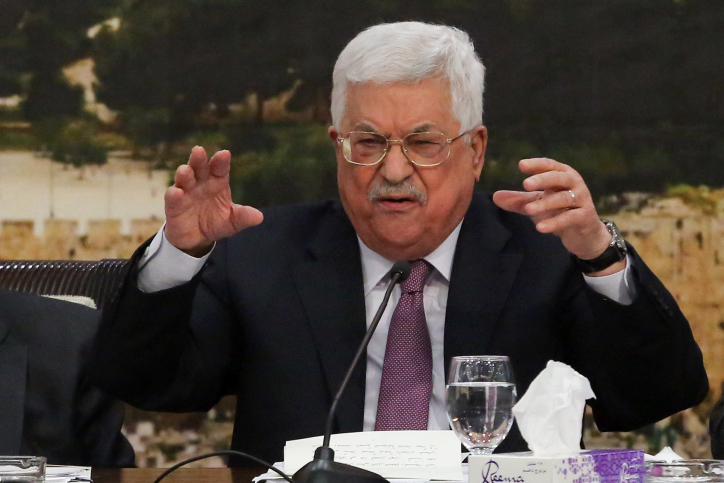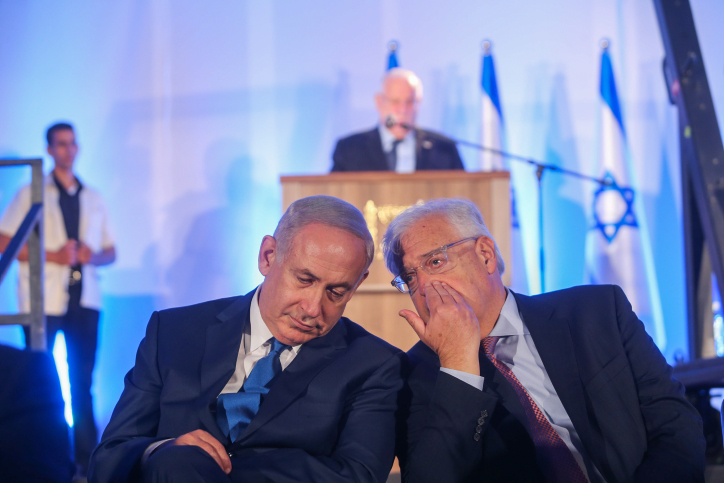Abbas’ attack on Trump and top White House officials signals that he no longer wants the U.S. involved in peace negotiations. Gradual recognition of a Palestinian state is now his preferred course of action.
By Elhanan Miller

Those who survived Mahmoud Abbas’ tedious history during his speech to the PLO Central Committee on Monday, and avoided the temptation of focusing on the Palestinian president’s style over substance, was able to hear the core of his oration: redefining the Palestinian Authority’s relations with the United States under President Trump.
The speech’s central message focused on the utter refusal to return to the negotiating table with Israel through American mediation. Abbas proposed the five UN Security Council’s five permanent members, along with Germany (known as the P5+1) — who negotiated with Iran over its nuclear deal — as a possible alternative for mediation.
In the first part of his speech, Abbas emphasized the role of the United States in the history of the region’s colonization, in order to justify the “divorce.” Today, says the Palestinian president, the United States speaks in two voices: while the White House treats the PA as a state (Abbas mentioned the fact that Trump surveyed the Palestinian honor guard on his visit), and Congress — under pressure from certain lobby groups — treats it as a terrorist entity.
Abbas claimed that in 2011, when the U.S. demanded he refrain from joining UNESCO, he insisted on joining as a matter of principle to prove that Palestinians will not bow down before imperialistic dictates. The humiliation continued, said Abbas, in November of last year, when the Americans threatened to shut down the PLO’s diplomatic mission in Washington D.C. The Trump administration then reversed its decision, saying it would renew the mission’s permit every seven months, as long as the Palestinian flag is removed from the building.
“That is how the battle between us began,” said the Palestinian president. “We tell them: if the flag is removed, we will close down the office. Enough. We do not need an office, and we do not want to sit in Washington. They said ‘No, no, no. Not to that far.'” This, said Abbas, was how the PA reformulated its relationship with the United States.
Abbas claimed that today the U.S. has made peace with the Palestinians gradually becoming part of 500 conventions, agreements, and international bodies, yet warns against the PA joining 22 of them. The Palestinians, said Abbas, agreed to do so on the condition that the Americans leave their diplomatic mission in Washington D.C. open, do not move the U.S. embassy to Jerusalem, do not harm the economic aid to the PA, and ask Israel to stop settlement building. “If you do not make a commitment, we won’t make a commitment. What will be will be.”
In a moment of candor, Abbas revealed that he refused a request by Saeb Erekat, the PA official responsible for negotiations with Israel, to meet with U.S. Ambassador to Israel, David Friedman, due to thew latter’s refusal to use the word “occupation.” “I will not meet with this man,” Abbas clarified, “put him in a settlement.” Abbas also criticized U.S. Ambassador to the UN Nikki Haley for her “shameful” defense of Israel.

Every UN resolution that has passed and was favorable to the Palestinians was vetoed, Abbas protested. “Where will we go? Think about it. I do not have a solution. But we need to think about it. Not a single UN resolution was implemented. To whom will we complain? We’ll complain to Allah. But down here, there is no one?
Abbas ended his speech on an optimistic note. He praised the young Palestinians who meet with pro-peace Israelis, while emphasizing that “not all Israelis are alike. There are those who support peace and those who oppose it. We must try.”
Those meetings, he says, are helpful, and thus will continue. “With whom do we want to make peace? With Israel. When there will be peace, when there will be Israel and Palestine, we will need to live together in coexistence. So we are already speaking to one another now, regardless of whether Netanyahu rejects peace.” He reminded those present that he was the first to support welcome a meeting with the Israeli Communist Party, and was not deterred from harsh criticism.
Abbas’ attack on Trump and top White House officials shows he is burning bridges with the U.S. Joining international conventions, and a gradual recognition of a Palestinian state in the United Nations, is now his preferred course of action.
Elhanan Miller is a research fellow at the Forum for Regional Thinking, where this article was first published in Hebrew.
